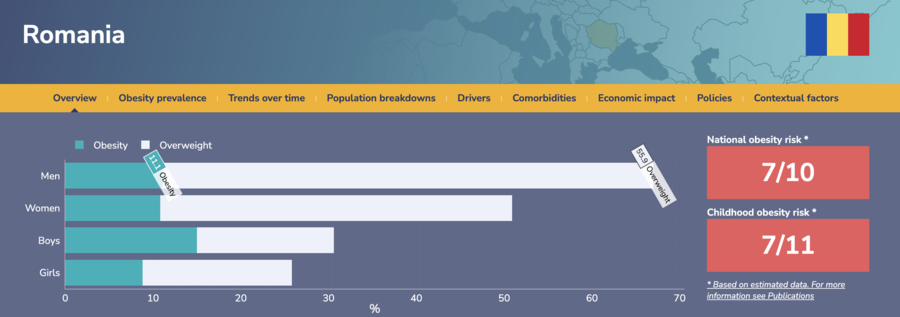
Is it true that Romania outlaws excessive weight and, therefore, there are "literally zero" people with a body mass above normal? No, that's not true. The website of the Chamber of Deputies, which typically initiates legislation and in some cases approves bills proposed by the upper house of the national parliament, shows no signs of such law. The chamber's spokesperson told Lead Stories that she has no knowledge of any bills proposing that. The country has a significant share of overweight populations, including children, though it scores relatively low on the overall obesity index among European states.
The claim appeared in a post on Instagram on February 6, 2023. The caption said: "Romania is BASED" (a slang term for carrying yourself with swagger.) The on-screen text continued:
Why being fat is illegal in Romania
Here is what it looked like at the time of writing:
(Source: Instagram screenshot taken on Thu Feb 9 16:20:24 2023 UTC)
The video showed the controversial British-American blogger and former kickboxer Andrew Tate, arrested in Romania in December 2022 on charges related to the exploitation of women. He did not talk about the legality of being overweight in this clip. Instead, he said:
In Romania, you see literally zero fat people. And the reason for that is because it's not socially acceptable. Fat shaming works to the point where people will train just for vanity.
The same clip featuring Tate appeared on YouTube as well.
But the post's claim stated in the on-screen text is false, and Tate's monologue involves factually incorrect statements.
A search for relevant keywords in Romanian ("masa," "greutate", "supraponderal", "supraponderalitate", "obez", "obezitate", "obezitatii", "corporal") on the website of the lower house of the Romanian parliament, the Chamber of Deputies, shows no results.
Both chambers of the Romanian parliament can initiate legislation, but to become law, a bill has to be approved by both of them. Had a law prohibiting being overweight existed, it would appear on the site of the Chamber of Deputies.
Moreover, a search form that allows a search by topic of legislative initiatives that didn't or haven't yet become law shows nothing that would indicate a discussion about prohibiting overweight at the national level.
never heard of such a law.
According to the 2019 official European Union (EU) data, Romania is among the European countries with a low share of obese people:
In 2019, for the population aged 18 years and over, the lowest proportions of women considered to be obese were observed in Italy (10.7 %), Romania (10.8 %), Bulgaria (11.9 %) and Cyprus (14.1 %). On the other hand, obese men registered the lowest shares in Romania (11.1 %), Italy (12.9 %), the Netherlands (13.2 %) and France (14.3 %).
Obesity is not a subjective term -- it can be calculated using the body mass index (BMI). According to the U.S. Centers for Disease Control and Prevention, the term "obesity" only describes the most severe cases of excessive weight:
- If your BMI is 25.0 to <30, it falls within the overweight range.
- If your BMI is 30.0 or higher, it falls within the obesity range.
The EU and the World Health Organization (WHO) use the same classification.
The World Obesity Federation estimates the national risk of becoming obese in Romania as 7 out of 10:
(Source: Worldobesity.org screenshot taken on Thu Feb 9 18:11:24 2023 UTC)
The 2019 WHO country profile additionally emphasized that in Romania:
... overweight and obesity rates in children have increased over the last decade to reach 15 %
The 2022 WHO report concluded that 58 percent of Romanians are overweight.
The government has implemented a set of regulations to reduce the scale of the problem, but, according to the September 2022 World Obesity summary, the existing policies and programs do not make overweight illegal or impose any penalties on people from this group.
Lead Stories previously debunked claims related to body mass, for example, here.
Lead Stories fact checker Irina Tacu contributed to this article.



















